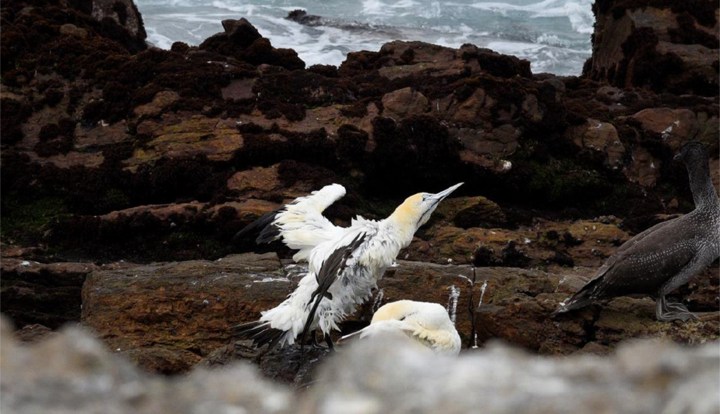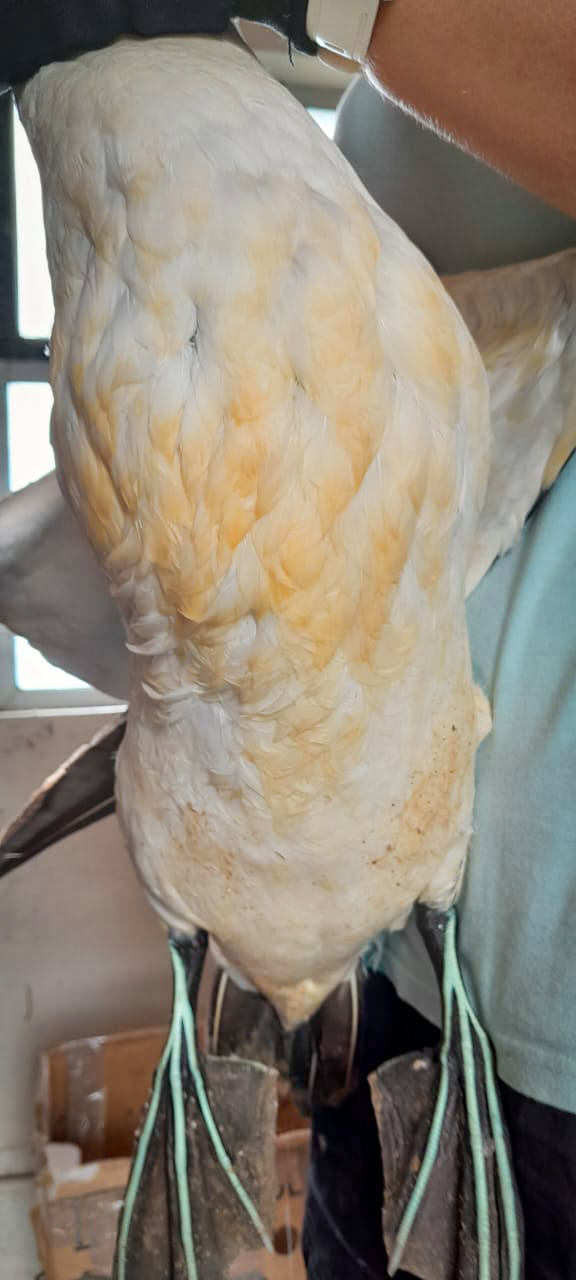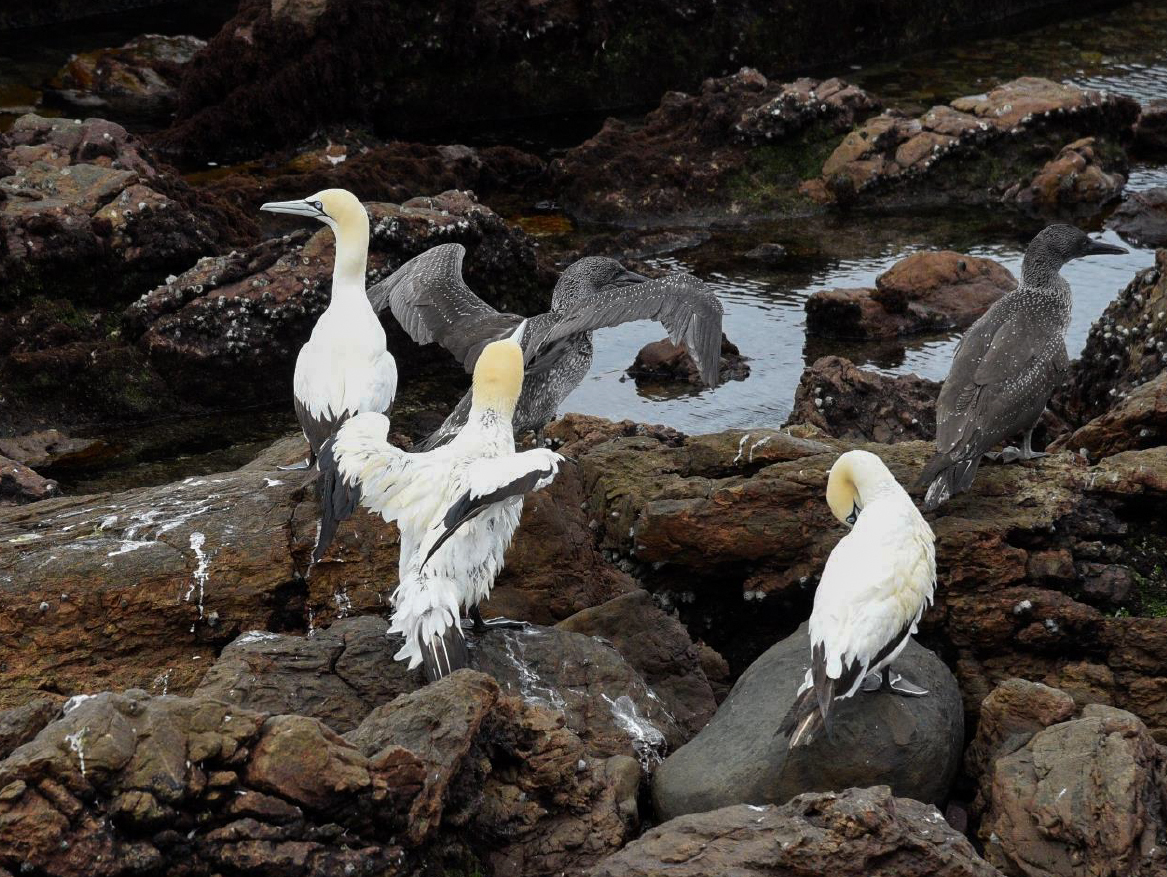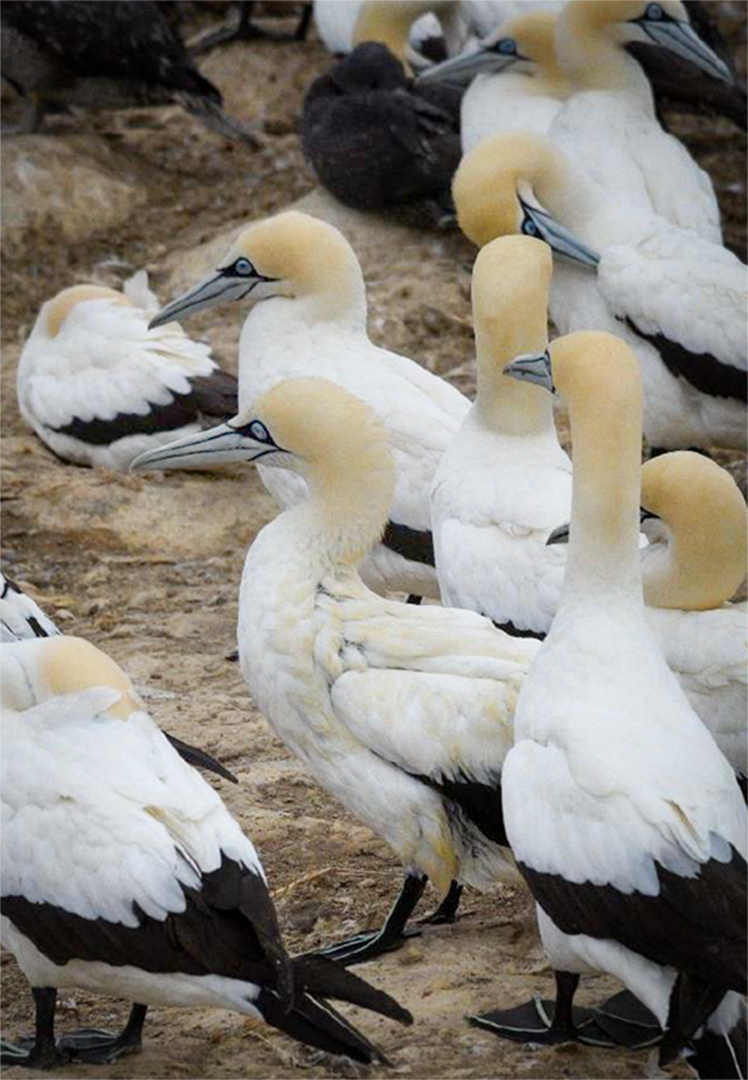ALGOA BAY
Rescue operation launched for endangered seabirds coated in mystery ‘fish oil’

The discovery of at least 100 oil-soaked Cape gannets in Algoa Bay in the Eastern Cape has raised concern among seabird and marine conservationists, with indications that the birds were coated by a mysterious plume of ‘fish oil’.
The affected birds, whose feathers were stained yellow and also smelled strongly of fish, are at risk of drowning, starvation or dehydration due to contamination of their feathers.
They were found on Bird Island, about 65km east of Gqeberha. It’s the largest remaining Cape gannet colony in the world.
Now restricted to breeding colonies on just six islands off the coast of South Africa and Namibia, Cape gannets are classified as endangered because the species has undergone a significant population decline over the past three generations and is projected to continue to decline rapidly over the next three generations.
According to a statement by the South African Maritime Safety Authority, the first oiled birds were spotted by a ranger on Sunday 17 March. A subsequent assessment revealed more than 100 oiled gannets. This number could rise.

Badly-oiled birds are unable to fly or swim effectively and can drown or die from starvation. (Photo: Caitlin van der Merwe/Sanccob)
About 30 of the most compromised birds — those that are underweight or heavily oiled — have already been rescued and transported to the Southern African Foundation for the Conservation of Coastal Birds (Sanccob) facility in Gqeberha for stabilisation, washing and rehabilitation.
Sanccob spokesperson Monica Stassen noted that this was the third report since January 2023 of birds being oiled with a thick yellow substance, which had a consistency similar to wood varnish.
“What started as a minor concern has become increasingly alarming, with a higher number of birds being affected. The substance appears as a yellow stain on the feathers and has a distinct fish smell. Affected feather samples have been taken for analysis and work is underway to try to determine the exact type of pollutant.”
Stassen said she was not able to comment on the origin of the pollutant — though sources in Gqeberha speculated that the substance could have been dumped by a passing ship or, possibly, a foreign “fish factory” vessel.
While not toxic to seabirds, Stassen said fish oil disrupts feather waterproofing.
“The fish oil removes waterproofing qualities, so the cold water can penetrate the skin. The birds are unable to regulate their body temperature, making them more susceptible to hypothermia.
“In addition, they become waterlogged and are unable to fly or swim effectively and can drown. Birds that are unable to swim or fly will eventually die from starvation or dehydration.”
Birds in this condition therefore needed to be stabilised before undergoing a washing process and rehabilitation to restore feather waterproofing and overall body condition. This could take four weeks or longer.
“At this time, we do not know what the cause of the contamination is, and we strongly urge management authorities to investigate these incidents,” said Stassen.

Badly-oiled Cape gannets seen on Bird Island. (Photo: Caitlin van der Merwe/SANCCOB)
Dwindling populations
Cape gannets are endemic to South Africa and Namibia and found only at six colonies worldwide; Possession, Ichaboe and Mercury Islands in Namibia, and Lambert’s Bay, Malgas Island and Bird Island in South Africa.
The species has been listed as Endangered since 2017 globally, and Critically Endangered in Namibia.
Bird Island, where the oiled birds were found, is home to between 90,000 to 100,000 breeding pairs, making it the largest Cape gannet colony in the world.
While this appears to be a large number, the population of this species has declined rapidly over a relatively short period — Birdlife International estimates that overall numbers dropped by about 52% between 1956 and 2016.
Researchers say there has also been a gradual southerly redistribution of the species over recent decades, with approximately 70% of the global population now found at Bird Island.
According to a 2019 conservation status assessment by marine ecologist Dr Richard B Sherley and colleagues, most Cape gannets bred in Namibia during the 1950s and 1960. But by 1978 numbers were shared evenly between Namibia and South Africa, and from 1997, more than 80% of Cape gannets bred in South Africa.

Oil spills are a serious threat to Cape Gannets. In 1979, fish oil killed at least 709 gannets at Lambert’s Bay and the 1983 MT Castillo de Bellver crude oil spill affected around 5,000 Cape Gannets in the vicinity of Saldanha Bay. (Photo: Caitlin van der Merwe/Sanccob)
Sherley said the southward shift of Cape gannets from the late 1960s was thought to be linked to a similar relocation of its main prey species — sardine and anchovy.
Sardine stocks off Namibia were depleted through overfishing in the 1960s and 1970s and had not recovered. Other researchers reported a movement of sardine and anchovy from the west to south coasts at the end of the 1990s.
Apart from declines in fish prey, gannets are also vulnerable to predation by seals and some seabirds during the breeding season.
For example, Cape fur seals killed an estimated 27,000 fledglings around Malgas Island in the early 2000s and a further 900 around Ichaboe Island.
At Lambert’s Bay, between 2009 and 2013, kelp gulls were reported to have eaten an average of 13% of the gannet eggs, while Great White pelicans have also eaten gannet chicks at Malgas Island.
Sightings of oiled seabirds can be reported to Sanccob Gqeberha on 041 583 1830 or after hours on 064 019 8936. If you would like to contribute financially to the rehabilitation of the recovered gannets, please donate at https://donations.sanccob.co.za/ and select ‘Gqeberha Cape gannets’. DM



















 Become an Insider
Become an Insider
Filthy humans at it again destroying nature ,we must be the worst of all the planets evolutions